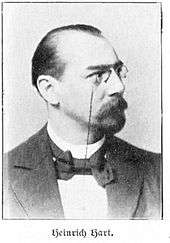Cäcilie (Strauss)
"Cäcilie", Op. 27 No. 2, is the second in a set of four songs composed by Richard Strauss in 1894.
| Cäcilie | |
|---|---|
| Lied by Richard Strauss | |
 Lady Lilith by Rossetti (1866). | |
| English | Cecilia or Cecily |
| Catalogue | Op. 27 number 2, TrV 170. |
| Text | Poem by Heinrich Hart |
| Language | German |
| Composed | September 9 1894 |
| Dedication | Pauline de Ahna, composer's wife. |
| Scoring | Voice and piano |
The words are from a love poem "Cäcilie" written by Heinrich Hart (1855–1906), a German dramatic critic and journalist who also wrote poetry. It was written for the poet's wife Cäcilie.
German pronunciation: [tsɛːˈtsiː.liːə], or UK English as "Cecilia".
History
Strauss composed the song at Marquartstein on 9 September 1894.[1] , the day before his wedding to the soprano Pauline de Ahna. All four of the Opus 27 songs, including Cäcilie were given as a wedding present to her.
Instrumentation and accompaniment
The song was originally written with piano accompaniment in the key of E major, but later orchestrated in his 'heroic' key of E♭. The instrumentation is: 2 flutes, 2 oboes, 2 clarinets in B♭, 2 bassoons, 4 horns in E♭, 2 trumpets in E♭, 3 trombones, tuba, 3 timpani, harp and the orchestral string section.[2]
The tempo direction is "Sehr lebhaft und drängend".[3]
Strauss, in his rich and lively orchestration, included parts for a solo string player from each section.
The change of key a semitone down from E to E♭ explains why, from bar 34 on the violas are asked to play the note B, a semitone below the lowest note normally possible on the instrument; and at this point Strauss asks half the violas to tune this string down a semitone.[4] For the same reason the full score, bar 39, gives the second flute the note B, a semitone lower than its normal lowest note.
Lyrics

| Cäcilie | Cecilia[5] |
|---|---|
Wenn du es wüßtest, |
If you but knew, sweet, |
Opus 27
The other songs of Strauss' Opus 27:
- Op. 27 No. 1 "Ruhe, meine Seele!" (Nicht ein Lüftchen regt sich leise)
- Op. 27 No. 3 "Heimliche Aufforderung" (Auf, hebe die funkelnde Schale)
- Op. 27 No. 4 "Morgen!" (Und morgen wird die Sonne wieder scheinen)
Recordings
There are many recordings of this, one of Strauss's most popular songs. Richard Strauss recorded it in once in 1944, accompanying the Austrian soprano Maria Reining on the piano.[8]
References and notes
- Trenner, Franz (2003) Richard Strauss Chronik, Verlag Dr Richard Strauss Gmbh, Wien, ISBN 3-901974-01-6. Page 118.
- Richard Strauss Lieder, Complete Edition Vol. IV, London, 1965, Boosey & Hawkes
- Full score: "Very lively and urgent".
- Note in the full score: "Die Hälfte nach H unstimmen"
- Translation by Paul Bernhoff
- Hart: "kämst"
- Hart: "Höhen"
- Richard Strauss accompanies (Vol.2), Preiser PR93262.